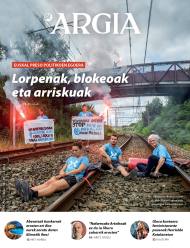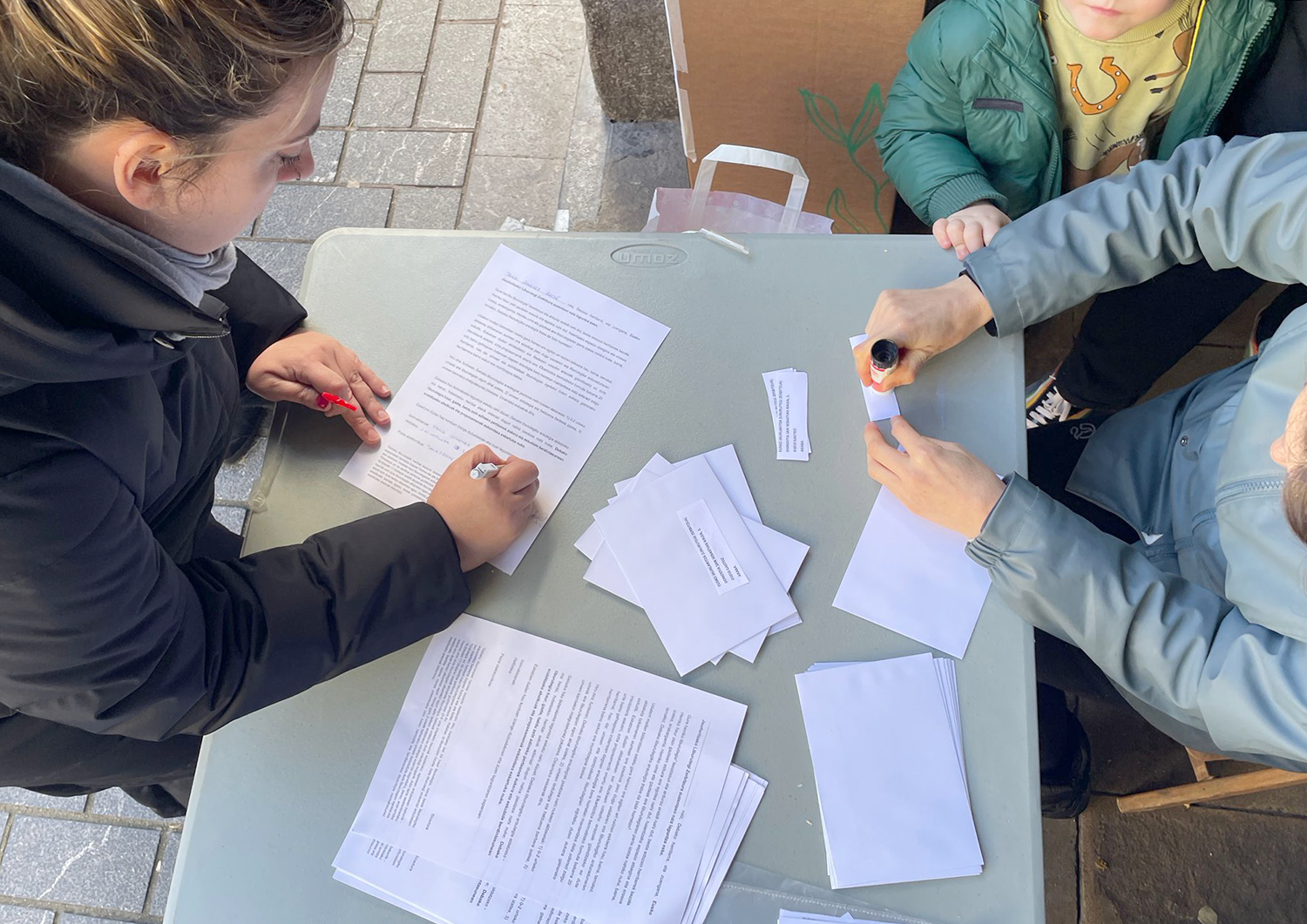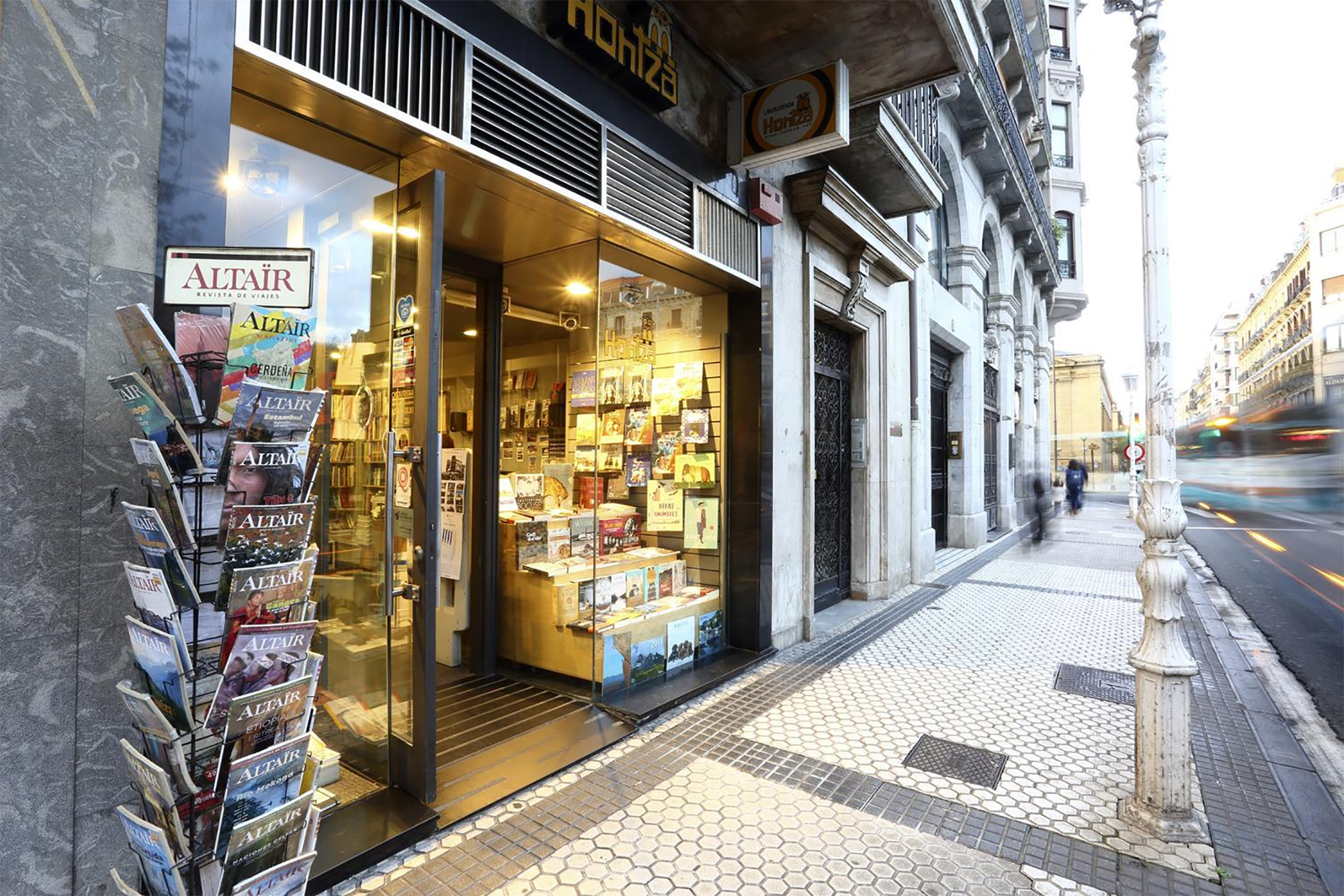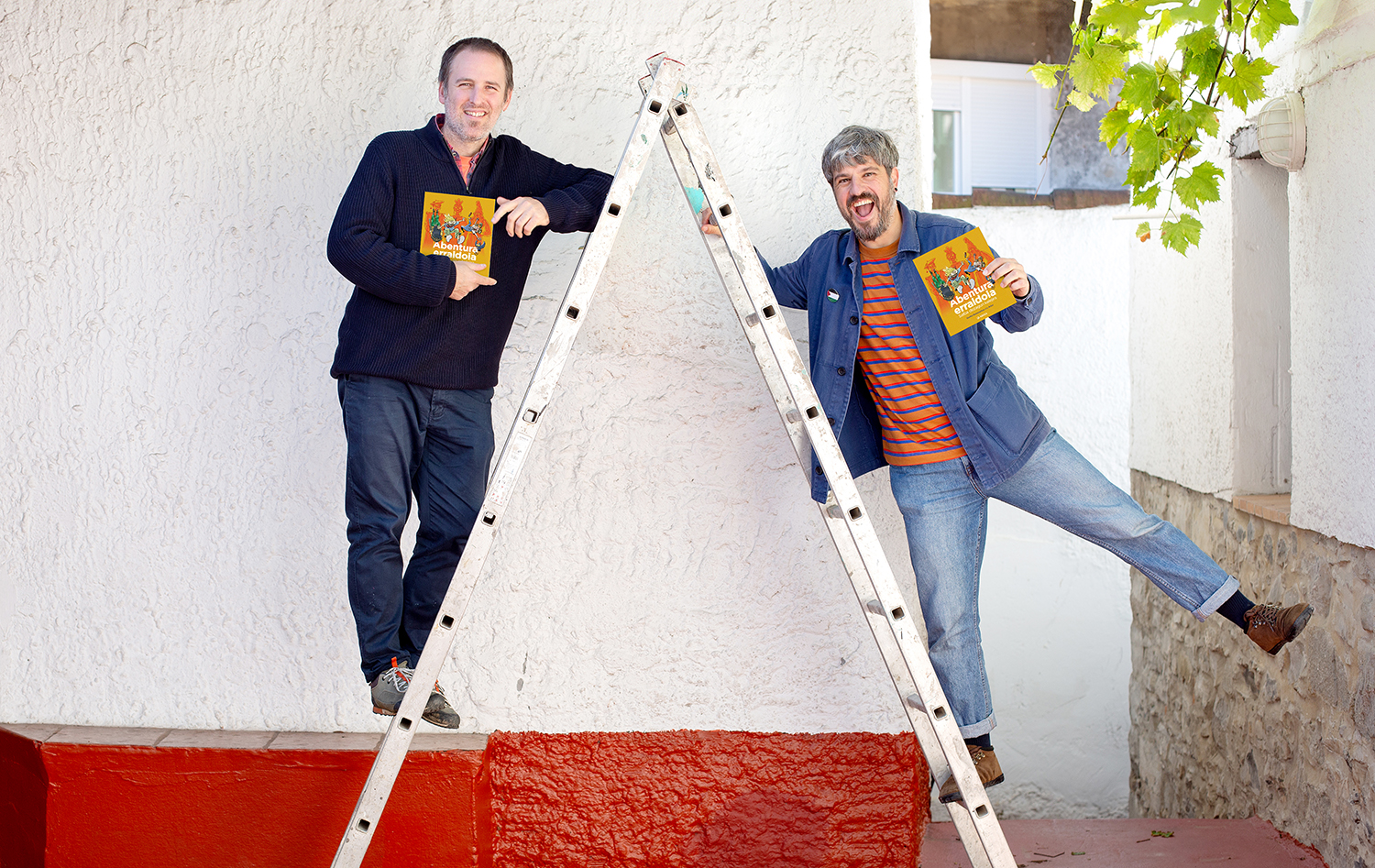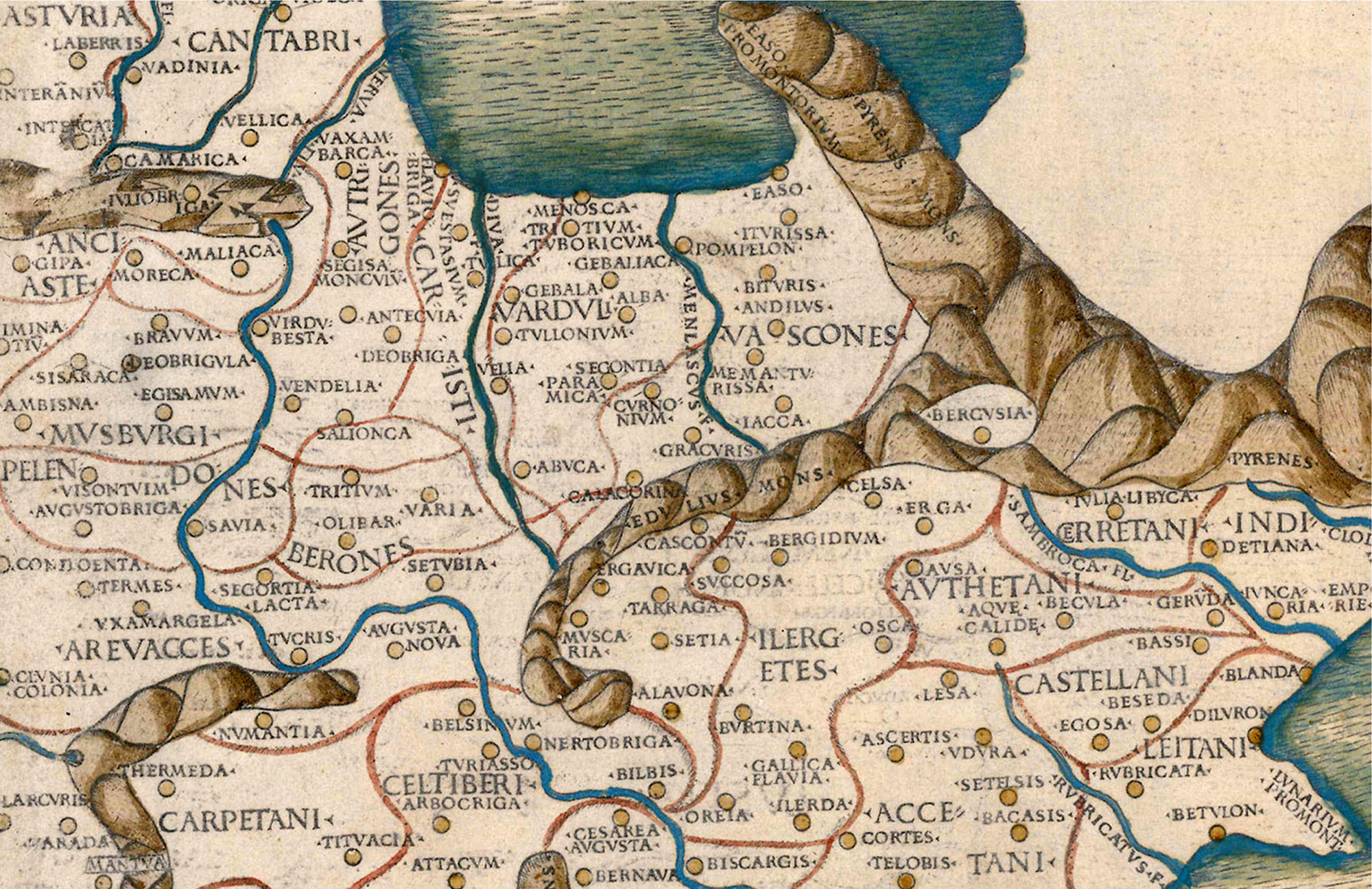"It is not fair that the Navarra Archive has 8,000 euros annually to buy old books"
- In France in particular, Aritz Otazu travels around the world looking for books from the 16th and 17th centuries. His passion and the objective of the Editorial Mintzoa, which he directs, is to make known the history of Navarra and Euskal Herria. Talk all day with customers, sellers, institutions, members of other independent publishers, media... It is undoubtedly a vocational cultural agent.

Aritz Otazu Lujambio. Irún, 1975
Document editor and appraiser. He specialized at the University of Leon in the field of old and modern books. He has been trained in Paleography in the Archivo Real y General de Navarra. He has been director of Mintzoa since 2014. This editorial created by its parents in 1983 is specialized in old books of the History of Navarra and in facsimile editions. He is a member of the Navarro Council of Culture and Arts and chairman of the Association of Editors of Navarra (Editargi) four years ago.
You're buying old books, but what exactly is your job?
My passions are books and history. I'm an appraiser of documents and old books. Technically it is an ‘old’ book with less than 100 years old and an older book. I mainly work with books from the 16th and 17th centuries related to the history of Navarra, which are mainly in France.
For this work, you must know the history to contextualize books and documents. In addition to selling books, I make private library appraisals for insurers. One thing is to value the price and the other the price you can get on the market. Currently the work of the Mintzo is divided into: In 70% we work with old books and in 30% with facsimiles and divulgative books.
How did it start with speech?
The editorial was created by father and mother. They were both professors at Oñati. His father loved the history of Navarre and his mother also infected his passion. In 1979 it was decided to abandon the work and create the Mintzoa to make known the history of Navarra. At that time there was much talk about Navarre as part of the Basque Country, but they claimed that Navarre was the cradle of the Basque Country. My father started making collections and then they sold a lot, like now. Arturo Campion, Reyes de Navarra, Iturralde y Suit, Navarro Villoslada... They then began publishing smaller outreach books and in 1995 began working with facsimiles and old books. Much more was sold before. It was a great Durango Fair. After Franco's death, people wanted to know our history and sold a lot.
I studied graphic design and pre-printing techniques. So I started working in the company that my father, Serinte, had to send me to the printing press the photolites of the books. In addition, I did a two-year master's degree in Zaragoza on the organization of events and founded a company.
When my father was about to retire, I began to approach old books and I learned a lot both on my own and from different studies: paleography in the General Archive of Navarra, the specialty of appraiser at the University of Leon, English, French... there is no own career for this, so I have been learning over time. I took the editorial board in 2014. My father and I got very good and he's still in touch with work because it's his passion.
What is your job like?
I really like this work. I don't care to spend many hours or take the car and talk to a possible customer to Tolosa [Occitania], for example. I like it.
In Italy, in Germany, in France... I go to many fairs and make many contacts, but I usually come back empty because I only buy books related to the history of Navarra and Euskal Herria. We are the last Mohicans in that.
.jpg)
"Buying books in store, we donate money to our industry, if not to Amazon."
Who do you sell old books to?
Any interested person. We are not antiquarian. They have thousands of books and we don't. We buy very few books, but very important. We have many contacts and we know who might be interested in these jobs. The institutions also buy, but not much. In Navarre, for example, the General Archive of Navarra very little or nothing. I am at the Navarro Council of Culture and I tell you that it is not fair that it should be EUR 8,000 a year to buy old books. A file shouldn't look at whether people are going to read that book. You must purchase for your function of preservation and protection of bibliographic heritage. All parliamentary political parties fail to do so.
On the other hand, we are often criticized by saying that the old book we have found was already known. All right, for some researchers, it may not be innovation, but for many. Notice, some people think Euskera was invented by Sabino Arana. Here are people like this, in Navarra! If we do not disseminate culture in society, it will not be possible to value old books. So I think libraries and archives should buy those books and then be able to offer them to the public.
The most important thing is Mithridates,
written in 1610 by theologian and linguist Caspar Waser in Zürich. Euskera is among the 130 languages of the world mentioned in it. Besides translating 100 words to Latin, it offers six pages to Euskal Herria. Other copies of the work are in the world's prestigious libraries, and I located and bought one in Turin in 2020.
And why do you make facsimiles?
Facsimiles serve to strengthen our history. What appears here is not the opinion of a historian, but copying a real document in the most faithful and endorsed by notaries. For example, it is demonstrated that in Navarra there was a Castilian invasion and military conquest. It is not an opinion or an interpretation. It's very difficult to make a facsimile. That's why we don't take them out like churros, it's only done with very important documents and books.
I think the step my father took in this was terrible. When everybody started, I told him it was going to be a failure, but so far we have taken eight facsimiles. People are very used to seeing art in paintings, but not so much to valuing the work of the facsimile.
So far we have published eight, including the first history of Navarre of 1632; the first constitution of Navarre of 1174; the Letter of Matxin Zalba of 1416, the longest text written in the Middle Ages in Basque and among the nobles; the letters of Amaiur, 51 letters signed by important legitimist heroes, and the testimony of Jaime Velota of Medrano.
Contrary to what some believe, the buyer of these jobs is not always a wealthy person. It is financed and can be purchased for EUR 100 or less per month. The key is to have passion and to feel that treasure transmits something to you. Some buy as an investment, but this is not the norm.
What has been the most successful? Undoubtedly
from the Lingua Navarrorum document. We took 365 copies and they ran out quickly. The former were sold for EUR 900 and the latter for EUR 2,000. That also remains: if demand increases, so does price, and it was a huge demand.
We take those facsimiles out for the public to see these documents. For example, the City of Leitza has taken a nice initiative in this regard: Lingua Navarrorum and other books and documents have been purchased and exposed in the city hall so that people can know the fragments of our history that are collected in them.
How is the process of making a facsimile?The first step
is to obtain the permission to handle the original copy, which is not always possible. You have to do a lot of paperwork and pay insurance. Then you must get the most suitable materials. We buy paper in Italy. These are very special papers and when you have to run many tests, it comes out expensive.
Do you now have any next facsimile in mind?Next year will be
600 years since Carlos III.ak granted the Union Privilege, the first law of Pamplona, and on that we are, but I do not know if we are going to be on time, because it is a very complicated job. This is a two-meter document, all by hand. We went to place Joseba Asiron on the City Hall of Pamplona, where you can see. We made two more specimens, one in the cathedral and the other in the central archive.
He is Editargi president of the Association of Editors of Navarra. What is your mission?
This association has 13 independent publishers, almost all in Navarra. Our goal is for people to know the books we publish. People believe that for this is enough the book fair, but in it comes mainly news, both state and foreign, but the books of Navarra have a very limited presence. We have a very powerful catalog, because we have been working for many years, and we want to demonstrate it, both through fairs and other cultural events, because it is very difficult to have a place in the shop windows of the bookshelves as.Llevamos six years in this and I have been president for four years.
How many books are published annually in Navarre?
Our partners publish an average of 200-230 books a year. There are great editorials, like Pamiela or Txalaparta, that take out about 50 books and a lot simpler. The oral expression consists of 5-7 books annually.
There are reports that the works published in Navarra are about 700 a year, but that include publications of the Government of Navarra, magazines... Todo.Yo I think that in Navarre the editing of books and quality works are done.
"We would need less hypocrisy, because if there are no subsidies there are publishers that don't publish in Basque"
What is the proportion of jobs in Basque Country?
20% approximately. These are subsidies because here in Navarra few books are sold in Basque. Very good books come out, but they sell little. We need to make people more interested and not just subsidies.
Should we look more at market tastes?
It is a very complex issue. Demand must be created and not limited to the current situation. For this, on the one hand, books in Euskera should reach the libraries and public libraries of all places. In order to achieve this, other policies would be needed, not just to bring out a subsidy. They should also purchase books and facilitate sale. And on the other hand, we would need less hypocrisy.
Why do you say that?
If there is no subsidy because some publishers do not publish in Basque. I don't mean we all have to take out books in Basque, because everyone has their own line, but we should talk about professionals, writers, translators, editorials -- to decide what work and how we do it. Without giving away personal work, we should all make an effort to make books that are actually sold. Everyone needs to be involved, because in the warehouses too many books are seen in Basque.
.jpg)
We are not antiquarian. They have thousands of books and we don't. We buy very few books, but very important
How are you with the crisis?
Bad. In language, for example, old books are sold very well, but they are very few. The pocket ones, on the other hand, go wrong. Sales have fallen by 30% in recent times and paper prices have increased by 40-50%. Distributors carry 50%, authors 10%, so for us the benefits have been drastically reduced.
10% is scarce, but that's what makes
the editorial ley.La must edit the book with 40%, layout it, print it and leave it ready for sale. Some authors prefer to make self-publishing and distribute it themselves, bringing copies to the bookstore. We understand, of course, but in those cases they are the ones who take all the work and risk.
On Amazon, some also publish ...
For us, Amazon is not a friend. Our books are sold on Amazon, but publishers don't put them there. We are also very white on this issue. We don't say it goes against Amazon, because almost everyone has bought something on those platforms and you can't go against it. But you can ask people to make an effort and buy our books in stores, even though Amazon sends the book home faster. What can't really wait four days? If we buy books in store, we donate money to our industry, but to Amazon.
In addition, these platforms publish everything that comes to them. There's no chicken at all. Perhaps the author considers that a book is very good, but it will not have enough quality to go to market. And that has consequences. We don't make books like churros.
The Sixth Fair of Navarra will be held at the end of October. What will it look like?
There will be 13-15 publishers. In addition to publishers, associations and all private entities that produce books can participate. We have the cooperation of the Parliament of Navarra and the Government of Navarra, but not of the City of Pamplona. This year we will be in the Plaza del Castillo and last week we have prepared a nice program: woman in the edition, translations into minority languages, sessions on unspeakable books… It is a very interesting and very useful fair to bring the world of the book to the public.
* * * * * * *
OF THE RECORD
Where will it be?
“I often wonder: Where is our culture? Where are all the books historically published in Navarre? I'm sure they're somewhere. I read in a document that King John of Albret brought cars and chariots loaded with books and documents. Where will they be?”
Party and recreation. Oral History of Rock Radical Vasco
Javier 'Jerry' Corral
Books, 2025
------------------------------------------------
Javier Corral ‘Jerry’ was a student of the first Journalism Promotion of the UPV, along with many other well-known names who have... [+]









